Easy Vegan Miso Soup
This easy vegan miso soup can be ready in just 20 minutes, making it a quick and convenient option for a delicious and nutritious meal. With its savory miso broth, tender tofu, and fresh vegetables, it’s a comforting and flavorful soup that will warm you up instantly.

If you love miso soup but have been afraid that it would be difficult to make, you’re in luck! This amazingly healthy vegan soup is made with a combination of mushrooms, tofu, miso, seaweed, and vegetables and takes only minutes to prepare.
We love easy Asian-inspired soup recipes like this Asian mason jar soup and our vegetable udon noodle soup. If you love umami flavor, try my easy oil-free miso sauce because it’s good on everything!
Reasons you will love this soup
- Rich in Umami Flavor: This vegan miso soup is packed with savory, umami-rich flavors from miso paste, seaweed, and mushrooms, offering a satisfying and delicious meal.
- Nutrient-Dense and Healthy: Filled with essential vitamins, minerals, and probiotics, this miso soup is a nutritious and gut-friendly option that supports overall wellness.
- Quick and Easy to Prepare: Ready in just minutes, this vegan miso soup is perfect for a speedy, wholesome meal on busy days.
Ingredients you will need

- Mushrooms- Shiitake mushrooms are a great addition to miso soup because they provide a rich, earthy flavor that enhances the soup’s umami depth. They also offer a meaty texture, making the soup more satisfying, while adding nutrients like fiber, vitamins, and antioxidants for a healthy, flavorful boost.
- Vegetable broth- Adds an extra layer of flavor and depth compared to just water, making the soup more robust and savory. It also keeps the dish entirely plant-based and boosts its nutritional content with vitamins and minerals from the vegetables.
- Miso- White miso paste is ideal for making miso soup because of its mild, slightly sweet flavor and smooth texture, which creates a delicate and well-balanced broth.
- Veggies- Broccoli florets and carrots are my vegetables of choice to include in this soup. They add flavor and texture.
- Tofu- Used in miso soup for its ability to absorb the flavors of the broth while adding a satisfying, protein-rich texture. It provides a light, creamy element that complements the umami depth of the miso paste, making the soup more filling and nutritionally balanced.
- Seaweed- Nori sheets are used to add a boost of umami and a subtle sea-like flavor that complements the broth.
What is miso paste?
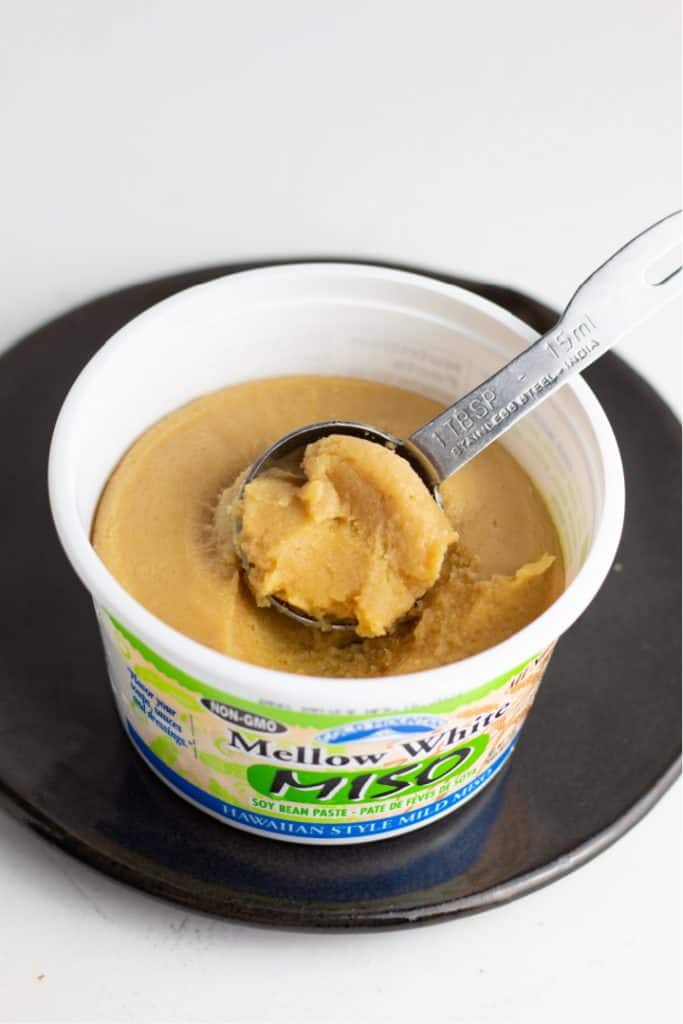
The main ingredient that flavors this soup is miso paste. Miso paste is a traditional Japanese food that can be found in the refrigerated section of many grocery stores as well as natural food stores and Asian markets. It is commonly called soybean paste and has a mellow, slightly sweet flavor.
Miso is delicious when used in soups like this as well as some other recipes like healthy oil-free salad dressings and sauces.
Tips & suggestions
- Ginger- Dry ground ginger can be used in place of fresh ginger, but I think the freshly grated ginger adds so much flavor.
- Sourcing ingredients- Nearly all of the ingredients needed for this Japanese Miso Soup Recipe can be found at your local Asian market, and for a much cheaper price than shopping at specialty stores.
How to make vegan miso soup
The recipe card at the bottom of the page has the full list of ingredients with measurements and instructions.
Even reluctant cooks will have success with this recipe. If you have a pot and a few items from the grocery store, this savory soup can be in bowls in your kitchen in no time.

STEP #1: Begin by pouring the veggie broth (or this Easy Dashi Stock) into a large soup pot, and bringing it to a boil.
Remove from heat, add the dried mushrooms, cover, and let stand 20 minutes or until mushrooms have softened. If using fresh mushrooms, you can skip this soaking part.
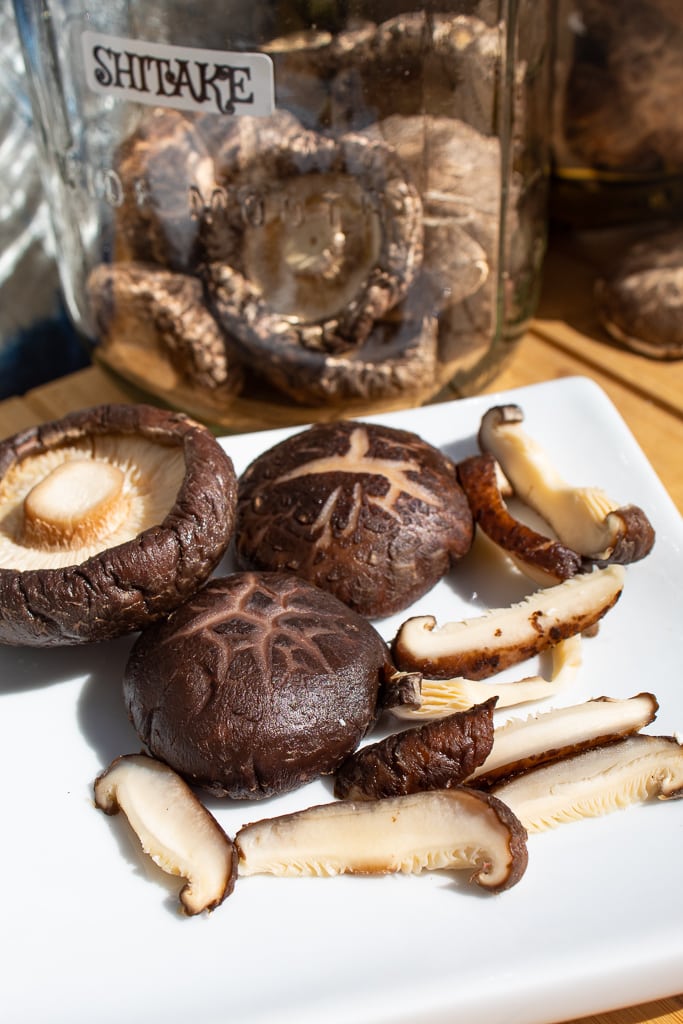
STEP #2: Remove the rehydrated mushrooms from the broth with a slotted spoon. Cut off and discard the mushroom stems. Thinly slice the caps and set them aside.
If you make your own veggie stock, the stems would be perfect to add to your scrap bag in the freezer.
I also sometimes buy dried mushrooms that are already sliced thin, which makes this recipe (and others) come together even faster because there’s no need to slice and destem the mushrooms.
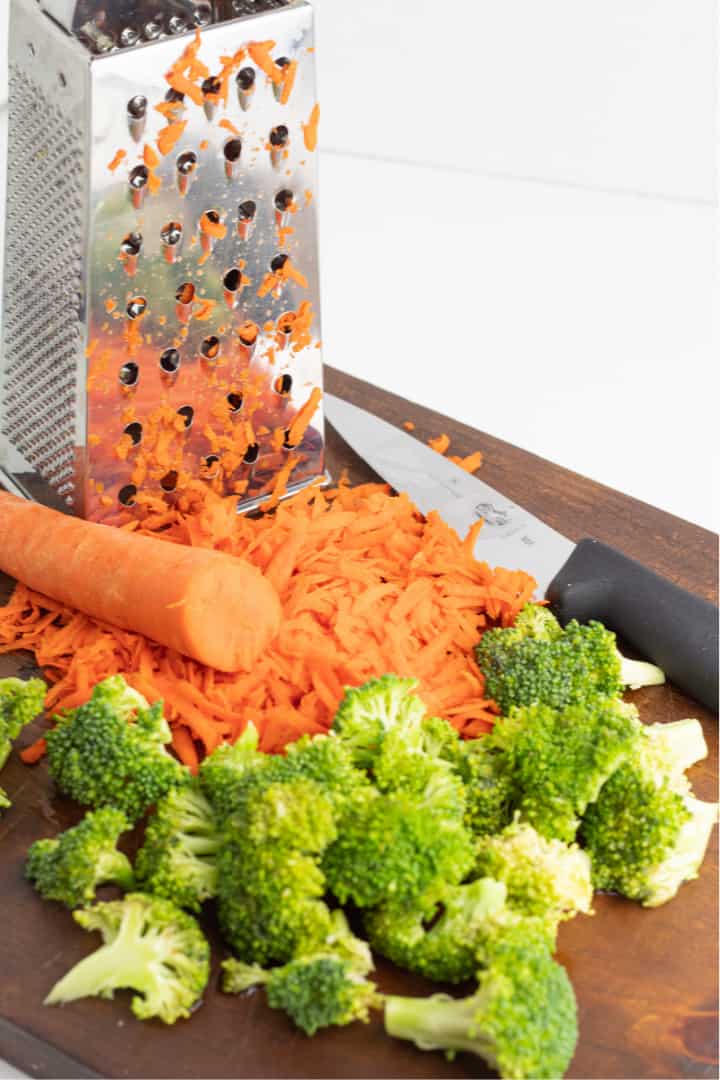
STEP #3: While the mushrooms are soaking is a perfect time to prep all of the veggies and other ingredients that need to be chopped, sliced, and grated.
I like to slice the broccoli into small bite-sized florets and grate the carrots. However, if you want to just purchase a bag of julienne carrots already prepped, that would eliminate another step for this recipe.
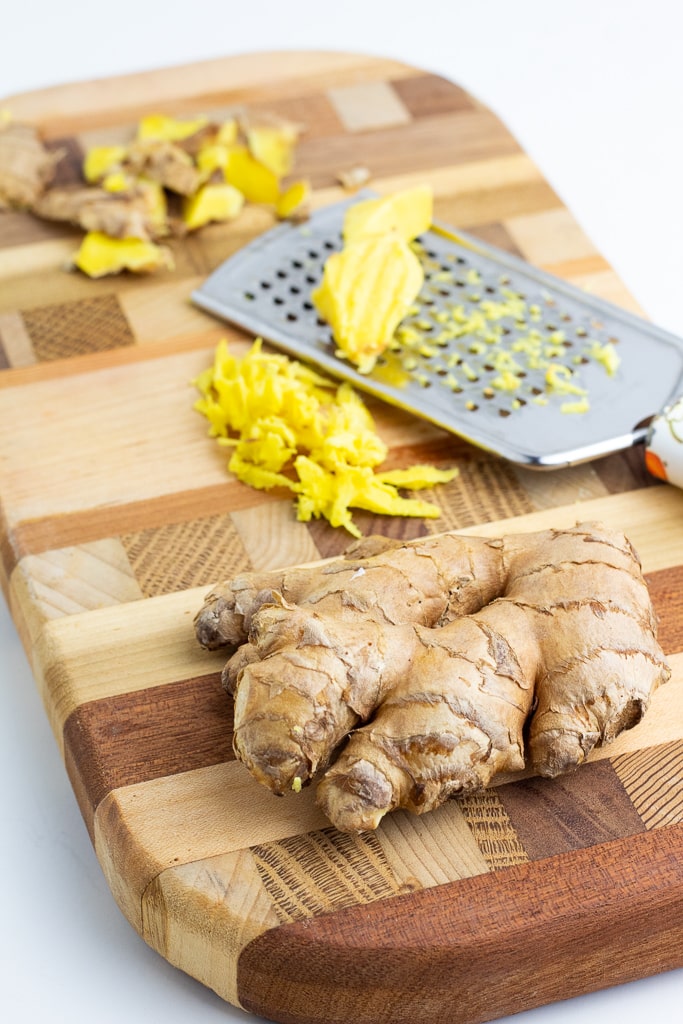
STEP #4: You will also want to go ahead and grate the fresh ginger. If you only have dry ground ginger on hand, that can work in this recipe, but I really enjoy the flavor of fresh.
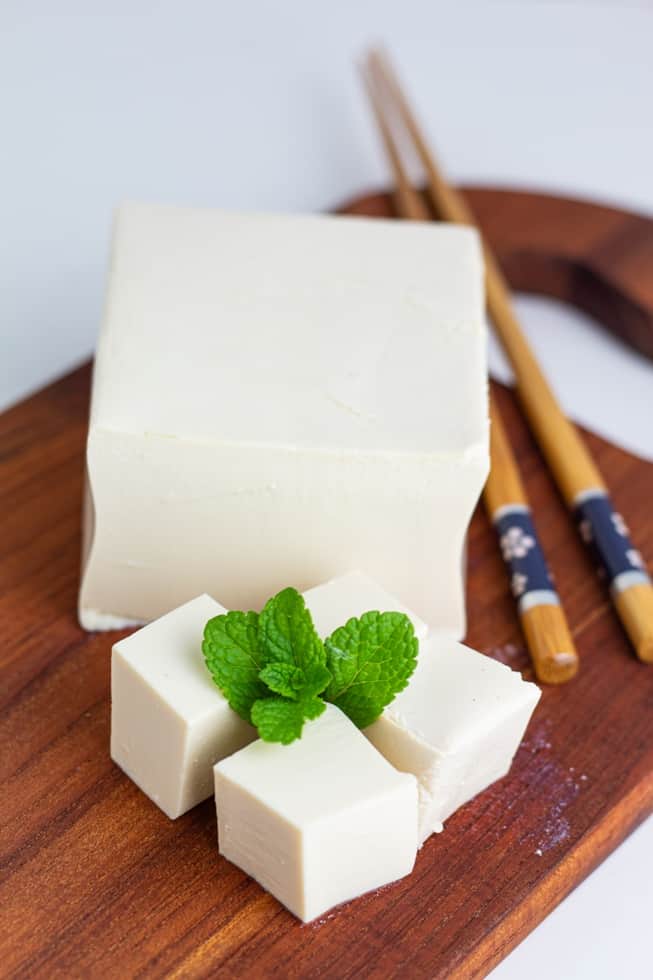
STEP #5: Drain the water from your tofu. Once the tofu is ready, slice it into 1/4″ cubes.

STEP #6: Cut the nori sheet into 1″ squares using scissors.
Helpful hint: if your nori has become softened over time and needs to be crisped back up, simply hold the sheet over the heat of a stove eye or a toaster for about 30 seconds. It will become
STEP #7: Add the tofu, nori, and ginger to the broth in the pot. Bring to a simmer and cook for 3 minutes.
STEP #8: Add the mushrooms, broccoli, and carrots. Cover and simmer for 1 minute, just until the broccoli turns bright green.

STEP #9: You’ll need to break the miso paste down into a broth before adding it to the soup. To do this, transfer 1 cup of the broth from the pot of veggies into a bowl.
Stir in the miso with a whisk or fork until it is completely dissolved.

STEP #10: Pour the dissolved miso into the soup and stir until it is well incorporated.
There is no need to cook the soup anymore. Serve immediately while warm.
Recipe from The Cancer Survivors Guide by Dr. Neal Barnard.
*Originally published July 2016.
Frequently Asked Questions
To avoid clumps, dissolve miso paste in a small amount of hot broth or water before adding it to the pot. Stir until smooth, then gradually mix it into the soup to ensure a consistent texture.
For those sensitive to sodium, choosing low-sodium miso or using it sparingly can help manage intake while still benefiting from its flavor and nutritional value.
For those concerned about the salt in miso, this short 3-minute video Is Miso Healthy from Dr. Michael Greger with Nutritionfacts.org should help relieve concerns.
Yes, you can make miso soup in advance, but it’s best to add tofu and seaweed just before serving to keep them fresh and maintain their texture. Store the soup in an airtight container in the refrigerator for up to 3 days.

More Healthy Vegan Soup Recipes
If you try this recipe, please let us know how you like it by rating it and leaving a comment. We love to hear from you!
Want to Save This Recipe?
Enter your email & I'll send it to your inbox. Plus, get great new recipes from me every week!
By submitting this form, you consent to receive emails from EatPlant-Based

Vegan Miso Soup
Ingredients
- 5 cup vegetable broth
- 1 cup shiitake mushrooms (fresh or rehydrated from dry)
- 1 pkg silken firm tofu (12-14 oz) with water drained
- 1 sheet nori
- 2-3 teaspoons ginger peeled and grated
- 2 cups small broccoli florets
- 1 cup carrots julienned or grated
- 3-4 tablespoons white miso
- salt to taste if needed
Instructions
- Pour the veggie broth into a large soup pot and bring to a boil. Remove from heat, add the dried mushrooms, cover, and let stand 20 minutes, or until mushrooms have softened. If using fresh mushrooms, you can skip this soaking part.
- Remove the rehydrated mushrooms from broth with a slotted spoon. Cut off and discard the mushroom stems. Thinly slice the caps and set aside. If you make your own veggie stock, the stems would be perfect to add to your scrap bag in the freezer.
- I also sometimes buy dried mushrooms that are already sliced thin, which makes this recipe (and others) come together even faster because there’s no need to slice the mushrooms.
- I like to slice the broccoli into small bite-sized florets and grate carrots. However, if you want to just purchase a bag of julienne carrots already prepped, that would eliminate another step for this recipe.
- You will also want to go ahead and grate the fresh ginger. If you only have dry ground ginger on hand, that can work in this recipe, but I really enjoy the flavor of fresh.
- Slice the tofu into 1/4″ cubes. Then, cut the nori sheet into 1″ squares using scissors. Helpful hint: if your nori has become softened over time and needs to be crisped back up, simply hold the sheet over the heat of a stove eye or a toaster for about 30 seconds. It will become crunch and crisp again.
- Add tofu, nori, and ginger to the broth. Bring to a simmer and cook for 3 minutes.
- Add the mushrooms, broccoli, and carrots. Cover and simmer for 1 minute, just until the broccoli turns bright green.
- You’ll need to need to break the miso paste down into a broth before adding it to the soup. To do this, transfer 1 cup of the broth from the pot of veggies into a bowl. Stir in the miso with a whisk or fork until it is completely dissolved. Pour the dissolved miso into the soup and stir until it is well incorporated. There is no need to cook the soup anymore.
- Serve immediately.
- Stored in a covered container in the refrigerator, it will keep up to 1 week.
Video
Notes
- Ginger- Dry ground ginger can be used in place of fresh ginger, but I think the freshly grated ginger adds so much flavor.
- Storage- This soup can be stored in an airtight container in the refrigerator for up to 3 days.
- Sourcing ingredients- Nearly all of the ingredients needed for this Japanese Miso Soup Recipe can be found at your local Asian market, and for a much cheaper price than shopping at specialty stores.
Nutrition
Disclaimer
To obtain the most accurate representation of the nutritional information in a given recipe, you should calculate the nutritional information with the actual ingredients used in your recipe, using your preferred nutrition calculator. You are solely responsible for ensuring that any nutritional information provided is accurate, complete, and useful.
About Terri Edwards
Hi guys! I am the content creator behind EatPlant-Based and a licensed Food for Life instructor with the Physicians Committee for Responsible Medicine. I am passionate about sharing healthy recipes and tips to empower others to get healthy. I’m so glad you’re here! Read More…






how much tofu do I use? I am confused by the 1 12-40 ounce measurement
That was a typo, so thank you for bringing it to my attention. I use a package of 12-14 oz tofu for this recipe.
I’m confused. The ingredient list includes silken tofu, but the instructions say to press it. Silken tofu goes to mush if you try to press it. Is this supposed to be silken tofu, drained and patted dry, or firm tofu, pressed?
You’re right, that was confusing. Honestly, you can use regular firm tofu or silken firm. In the past, I’ve used either on. If using regular refrigerator tofu, be sure to press it. For silken tofu, simply drain the little bit of water and slice. I’ve updated the instructions. Thanks for letting me know.
The first time I made this I found it way too salty. The flavor mellowed the next day. I guess it was the miso or the nori. Overall, it was really delicous!
Glad that you liked it!
Just made this soup and it is delicious !! Definitely takes quite a bit longer than 20 minutes if you need to slice,grate, cut everything yourself but it’s well worth the effort !!!!
Hi Teri! Love your site! Love the new “Jump to Recipe” button. This would be great to have in the freezer for the dreaded cold/flu! Is there anyway to get sodium counts on your recipes? My husband is on low sodium diet after quad bypass last summer.
Thanks!
Ann
Hi Ann, I am so glad that you like the new ‘Jump to Recipe’ button. It does make getting to the recipe much quicker. Just be sure to check out the tips and special instructions in the text as well because that’s where I include lots more of the details for the recipes. A few of my recipes have sodium listed, but not the majority of them. For this particular one, Dr. Michael Greger has some great information on sodium in miso and how it’s different. This is his video if you want to give it a peek. https://nutritionfacts.org/video/is-miso-healthy/
It says use silken tofu in the ingredient list and then in the instructions it says to cut tofu into cubes. May want to change ingredient list to firm tofu.
Hi. I’ve never made miso but I have all the ingredients except the mushrooms. I’m confused about what to buy. You seem to equate the amount of fresh vs dried, calling for a cup of either. But isn’t a cup of dried, when rehydrated, a lot more in volume than a cup of fresh? At such a high price compared to button mushrooms or baby bellas, I’m not sure that I can afford of cup of dried shitake. Please clarify. Thank you!
Janet, yes, the one cup of mushrooms does mean fresh or rehydrated from dry. So, you’ll want 1-cup of rehydrated mushrooms if you’re using dry. It’s also really just a preference, as the amount can be changed to suit personal tastes. Major mushroom-lovers might add more, and others might add less. Hope you enjoy the soup!
Will this freeze well?
I haven’t tried freezing it. To be honest, I just had to look it up. It appears miso soup can be frozen in airtight containers for up to 6 months. Interesting!
Easy comforting soup and yummy.
Terri, Had not made this for a while. Since I had all the ingredients except shitake, used Portabello slices instead. It was delicious for lunch on a winter’s day,
Wonderful! Today is an excellent soup day here in NC too. So cold! Bring on the miso! 🙂
Between the miso and nori, the amount of sodium in this soup must be sky high.
Yes, I’m concerned about that too.
Janet and Gail, this short 3-minute video from Dr. Michael Greger on the health benefits of miso may help to relieve your concerns. https://nutritionfacts.org/video/is-miso-healthy/
Oh my gosh, this was so good! Ate it with a side of oil-free hummus and pita. A great meal!
Awesome! I am so glad you liked it.
Made this today, no ginger or tofu and too lazy to go to the store, so made it without. It was delicious, added some green onion as garnish. This will definitely be on my go to list.
Could I use frozen shiitake mushrooms in this recipe Terri? Thank you!
Yes, frozen should work just fine too.
Why throw away the stems?
The stems can be tough and chewy, but I don’t actually throw them away. Instead, I add them to my veggie scraps to make broth. https://eatplant-based.com/wait-dont-throw-those-veggie-scraps-out/